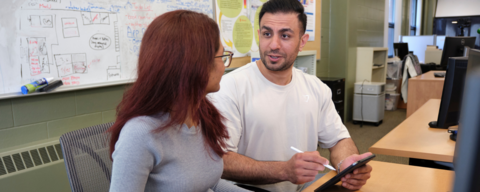Conducting research is an integral part of a graduate degree.
Support your fellow graduate students by participating in a research study. Research studies may be online or in-person, are often a single session, and provide immeasurable value to the graduate students conducting the research.
Jump to: Health studies | Math studies | Science studies | Advertise a study
Studies in the Faculty of Health
What mid-career means to nurses and what makes them stay?
This study has been reviewed and received ethics clearance through the University of Waterloo Research Ethics Committee, ORE #46503.
This study explores what supports experienced nurses in remaining in the profession, drawing directly on nurses’ lived experiences. The goal is to inform more practical, nurse-informed retention approaches that better reflect real workplace and life contexts.
- Format: Online
- Method: One semi-structured interview, conducted virtually.
- Length: One interview lasting about 1 hour.
- Participant requirements:
- Experienced nurses in the mid-stage of their nursing career
- Currently working in nursing or previously worked in nursing
- Practicing or formerly practicing in Canada
- Attachments: Study advertisement

Victoria Babysheva
School of Public Health Sciences
Supervised by Phil Bigelow
Research study on women's cardiovascular health
This study has been reviewed and received ethics clearance through the University of Waterloo Research Ethics Committee, ORE #47327.
Heart problems are common in women with breast cancer, and checking heart health early may help prevent future health risks. Current methods for assessing heart health in women with breast cancer are largely poor or unknown. The purpose of this study is to compare heart health risk assessments in breast cancer patients to healthy participants using measurements taken outside of the laboratory setting
- Format: In-person
- Method: Over three days, participants will take hourly 5-minute blood pressure readings during waking hours (approximately 10-12 measurements/day).
- Length: There is one visit to Toby Jenkins Applied Health Research Building (TBJ) 1142, which will take approximately 1 hour, in addition to taking hourly blood pressures for 3 days.
- Participant requirements:
- Aged 18-80 years old
- Not currently taking any medication affecting the cardiovascular system
- Not undergoing previous or present treatment with chemotherapy.
- Attachments: Information letter

Jessica Jasiak
Kinesiology and Health Sciences
Supervised by Jason Au
Co-designing Gender-Transformative Digital Games to Create Attitude Changes
This study has been reviewed and received ethics clearance through the University of Waterloo Research Ethics Committee, ORE #45951.
This study explores how digital games can be designed to shift harmful social and gender norms related to intimate partner violence (IPV). Participants will participate in co-design and playtesting sessions to provide feedback on a prototype game designed for young men (ages 18-25) using a gender-transformative approach.
- Format: Online
- Length: 90 minutes
- Participant requirements:
- Heterosexual cisgender men between the ages of 18–25
- Remuneration: $30
- Attachments: Recruitment letter

Veen Wong
School of Public Health Sciences
Supervised by Jim Wallace
Investigating the cerebellar contribution to sensory processing in ADHD
This study has been reviewed and received ethics clearance through the University of Waterloo Research Ethics Committee, ORE #43208.
This study aims to examine the role of cerebellum in attention deficit hyperactivity disorder (ADHD) and understand patterns of attention before and after TMS within ADHD and healthy populations.
- Format: In-person
- Method: Brain activity will be enhanced by using a non-invasive method called intermittent theta burst (iTBS), which uses magnets to change the electrical activity in the targeted location. Participants will be asked to complete a visuo-tactile task involving completing a cross-modal task using a mouse.
- Length: 2 hours
- Participant requirements:
- Age 18-40
- Accepting participants with and without an ADHD diagnosis
- Participants should have no history of seizures, neurological illnesses or events, active symptoms of concussion, and no medical implants/metal implants, and be willing to stop taking any medication that crosses the blood-brain barrier 48 hours prior to the study.
- Remuneration: $20
- Attachments: Recruitment letter
Simran Mughal
Kinesiology and Health Sciences
Supervised by Richard Staines
Structural and functional correlates of audiovisual integration
This study has been reviewed and received ethics clearance through the University of Waterloo Research Ethics Committee, ORE #23241.
In this study, a measurement of behaviour test and non-invasive brain imaging will be done using transcranial magnetic simulations. The purpose of this study is to obtain a more detailed understanding of the brain mechanisms of how audiovisual integration changes with age which may help to understand possible treatment options.
- Format: In-person
- Method: Audiovisual simultaneity judgment task where you will be asked questions about things you see and hear. See consent form for more information.
- Length: 2-3 hours
- Participant requirements: 20-50 years of age with normal or corrected to normal vision and hearing
- Remuneration: $10/hour
- Attachments: Consent form

Viquar Unnisa Begum
Kinesiology and Health Sciences
Supervised by Michael Barnett-Cowan
Studies in the Faculty of Math
Object manipulation and perception in virtual reality
This study has been reviewed and received ethics clearance through the University of Waterloo Research Ethics Committee, ORE #45474.
This study examines how people interact and perceive objects in virtual reality. Participants are expected to perform a simple object moving task and estimate the size of the object with their hand.
- Format: In-person
- Method: Participants will use a virtual reality headset and answer a survey about their experience.
- Length: 1 hour
- Participant requirements:
- 18-64 years old
- Exclusion criteria: Individuals with visual impairments, audio impairments, balance impairments, or medical implants
- Remuneration: $20 Amazon gift card
- Attachments: Recruitment poster
Junhyeok Kim
School of Computer Science
Supervised by Mark Hancock & Dan Vogel
Studies in the Faculty of Science
Autophagy-related genes as biomarkers of ocular surface aging and health
This study has been reviewed and received ethics clearance through the University of Waterloo Research Ethics Committee, ORE #47232.
This study aims to examine how the ability of cells to recycle proteins is related to ocular surface aging and disease.
- Format: In-person
- Method: Collection of cells from the surface of your eye by pressing a small piece of paper on the white part of your eyes
- Length: 1 hour
- Participant requirements:
- Young adults (18-25 y/o) with no dry eyes, elderly adults (>= 65 y/o) with AND without dry eyes who do not wear contact lenses and who are not pregnant or breastfeeding
- Remuneration: Participants will receive $20 for their time and reimbursement for parking or public transit (max $7.25)
- Attachments: Information letter

Nijani Nagaarudkumaran
School of Optometry and Vision Science
Supervised by William Ngo
Role of lysosomal membrane stability and protease activity in the pathogenesis of Sjögren's syndrome dry eye
This study has been reviewed and received ethics clearance through the University of Waterloo Research Ethics Committee, ORE #47663.
Sjögren’s disease (SjD) is a rare autoimmune disease that causes patients to suffer from severe dry eyes. The dry eye is often dismissed or confused with typical dry eye disease. Currently, there are no tools or methods for doctors to tell these two types of dry eye apart quickly and accurately. This results in a prolonged diagnosis time or misdiagnosis of SS patients that delays their treatment. The goal of this study is to differentiate between SjD-related dry eye and typical dry eye using cathepsin S, cystatin C, lysosome associated membrane proteins 1 (LAMP1) and LAMP3 the ocular surface cells. This study will be beneficial in deepening the understanding of SjD and for a shorter time-to diagnose for SjD
- Format: In-person
- Method: Ocular surface evaluation and collection of cells on the surface of your eyes. A numbing eye drop will be used for the collection.
- Length: 1 hour
- Participant requirements:
- Minimum 18 years of age
- Experience severe dry eye, OR has a known diagnosis of Sjögren's disease
- Remuneration: $20
- Attachments: Consent form
Ivy Vong
School of Optometry and Vision Science
Supervised by William Ngo
